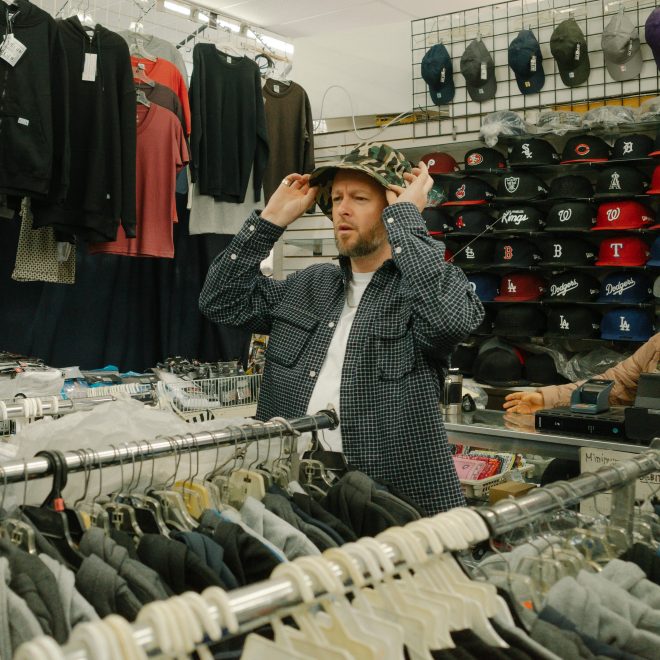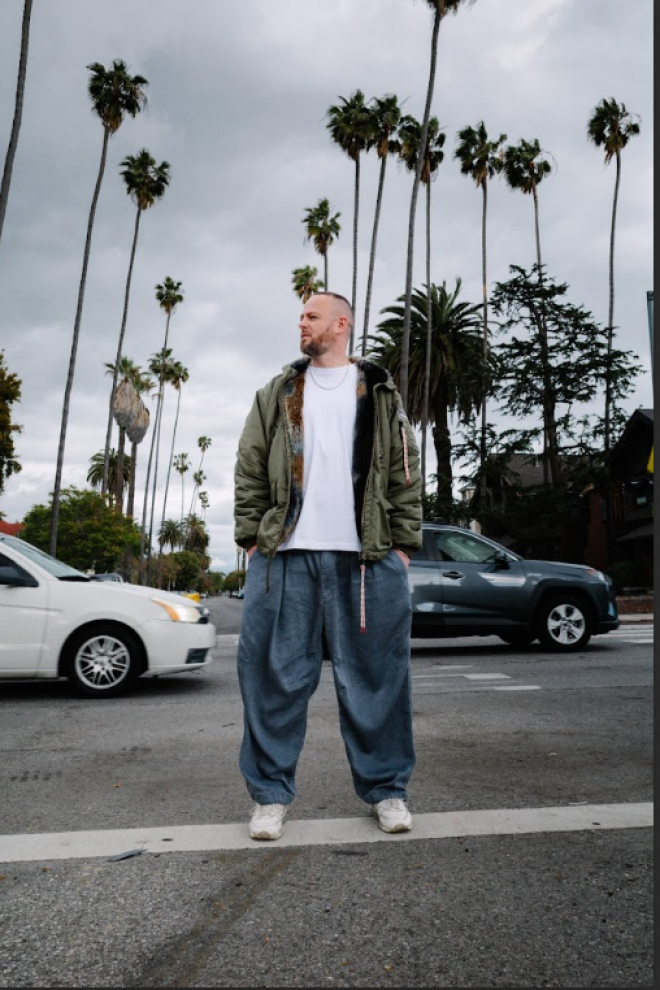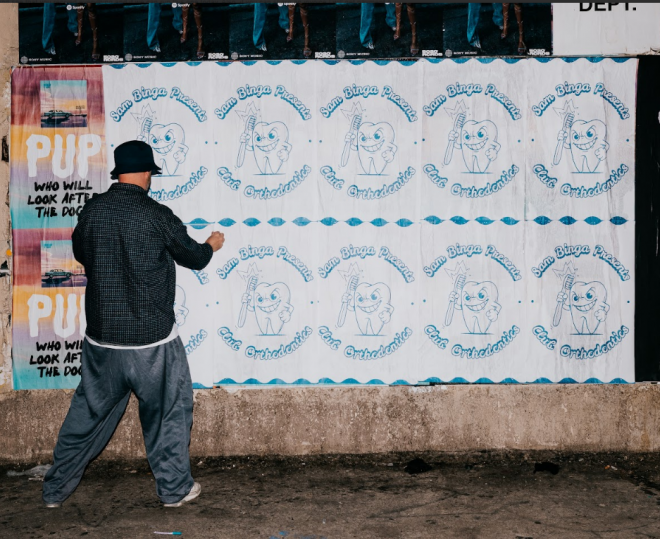Sam Binga’s ‘Club Orthodontics’ is a Community Mixtape with Bite
Pineapple Records’ first full-length release is a genre-mashing love letter to underground culture, brought to life by a decade of collaborations, creative risk-taking, and some of the fiercest talent on the club circuit.

Few artists navigate the undercurrents of global dance music with as much style, wit, and DIY fervour as Sam Binga. The Bristol-based producer, DJ, and label boss of Pineapple Records has spent the last decade quietly redefining what it means to build and nurture a scene, not from the top down, but from within. On Club Orthodontics, his first full-length release on the Pineapple imprint, Binga goes all in: 13 tracks, dozens of collaborators, and a fearless celebration of the community that has shaped his musical DNA.
Released last month, Club Orthodontics is more than a mixtape. It’s a panoramic snapshot of the world Binga has built – where broken beats, baile funk, grime, juke, garage, Baltimore club, and acid techno collide under one sticky roof. The guestlist alone is worth a double, take; Machinedrum, Fracture, Bakey, Redders, Emz, Snowy, Cesco, DJ Polo, Amy Kisnorbo, Rider Shafique, Mulii… the roll call reads like a who’s who of modern underground music, but filtered through Binga’s mischievous, modular, pineapple, flavoured lens.
The opening track, "Top Wina," reintroduces longtime partner, in rhyme, Redders, over a slamming, Chicago-indebted beat, featuring looped vocals and tweaky hardware chaos. From there, Butta (with grime MC Snowy) delivers a carioca-grime hybrid built for sweatbox rooms and late-night rewinds. No Chase, a ferocious team, up with Cesco and Emz, races at breakneck speed with garagey pressure and razor-sharp vocal flow. These aren’t just bangers – they’re carefully sculpted club weapons that reflect the diverse lineage Binga draws from.
And then there’s GDMT, a standout collab with Astrophonica’s Fracture, where mashed jungle breaks and a searing acid line meet in stripped, back euphoria. Binga describes it best: “Simple but intense.” That tension between wild, refined, raw, and surgical underpins the entire project.
The Redders, Binga chemistry is in full force on Never Dat, a colourful UKG mutation with absurdly good bars (“I got hard drive, dem man are still floppily!”). Meanwhile, Pinguini with Lrusse dives into dusty Latin vinyl and analog synths, wrapping them into loopy, funky techno with a Bristol twist.
There are softer moments too — like "MSG," a melodic, dream, dancehall lullaby created with Machinedrum during a rare studio session in LA. It’s an airy, sun-washed interlude that still pulses with a streetwise undercurrent. Equally compelling is Speedstep with DJ Polo, a 3-step / Amapiano / UK Funky chimaera that’s both euphoric and rugged, bursting with percussive detail and bassline heat.
The mixtape doesn’t shy away from experimental territory. Reductions — crafted by Mulii, Two Swords, ONHELL, and Binga — is a twitchy hybrid of drill, Jersey club, and baile funk. And IYP, a turbocharged footwork, fuelled jam with Bristol’s Amy Kisnorbo, is an instant highlight — cheeky, fast, and gloriously unhinged.
The closer, Badness 25, finds Binga teaming with the ever-brilliant Rider Shafique for a track that punches its rhythm into the mix. Created using boxing pads and processed drum sounds, it’s both a percussive oddity and an ode to the late ‘90s dancehall minimalism of artists like Buju Banton. “I love working like this,” Binga notes, “finding unique ways to create specific sounds. It gives the track purpose.”
As Club Orthodontics drops on Pineapple Records, we caught up with Sam Binga — the shape-shifting Bristolian behind one of the underground’s most unpredictable catalogs. With a decade of sonic mischief under his belt and a mixtape that ropes in everyone from Machinedrum to Amy Kisnorbo, Binga remains fiercely committed to the margins: bending genres, championing new voices, and reminding us that club music still thrives on risk. But beyond the bangers, there’s a deeper story — one of perseverance, purpose, and creative tension. So, we went in with seven bold questions to pull back the curtain.
During our conversation, Binga reminds us that the future of club music doesn’t lie in sticking to tradition—it’s in tearing it apart.

Club Orthodontics feels like a culmination of a decade’s worth of community, building, collaboration, and genre-defying experimentation. Looking back at the early days of Pineapple Records, what were the risks you took that nearly derailed everything, and what kept you from walking away when it felt like the payoff wasn’t guaranteed?
Being 100% real, starting Pineapple was the risk, but it was also the thing that led to me being around today. As a project, ‘Sam Binga’ initially gained recognition for its halftime, footwork-influenced take on DnB, which was incredibly exciting and led to some fantastic projects, such as the Richie Brains ‘supergroup’ and collaborations with artists like Om Unit, Chimpo, and Redders, among others. As that sound peaked and started to fall away, the obvious move would have been to shift into straight DnB, and I’m proud of some of the tunes I made where I gave that a go (tracks like ‘Rude Girl’ with OneDa and Particle still really work for me). Still, I felt like I’d have been doing that for ‘sensible’ and ‘career-driven’ reasons, and those kinds of reasons have just never really worked for me. Launching Pineapple with a UK Funky track in collaboration with a Grime MC (Emz) and a Toronto jungle OG (Marcus Visionary) was possibly the most confusing thing I could have done. Still, it made it clear from the jump that this was about more than just continuing to do what I was known for.
Sales initially were slow, but as the pandemic hit, there wasn’t any choice but to double down and set the stall out as best I could. And from doing that, I’ve got to meet and work with a massive range of different artists, and gradually build something that I think represents the things I value in dance music.
There’s an evident tension between the underground’s ethos and the increasing pressure for visibility, streams, and social presence. As someone who’s built a world around DIY values and raw sound, how do you personally navigate that balance between staying true to your weird, gritty instincts and the ever-looming demand to ‘scale up’ or ‘commercialise’?
I’m not sure they’re necessarily in opposition, or at least not as clearly as we often think. It’s a bit of a parallel take, but look at what a brand like Palace has been able to do, from blowing up, and getting to do collaborations with huge mainstream brands, they’ve also used that income to support some amazing UK skaters, they did the Mwadlands temporary indoor skatepark in Peckham, and they’ve put London skating on the map worldwide to an insane degree. I don’t love everything they do, but there’s something to be learned from how they just nailed what they do, stayed true to that, and grew from there.
So in terms of music, yeah, there’s a lot of stuff around that I don’t like or respect, but I’m holding onto the idea that if I (or we, as a label) hold onto what we love and are fundamentally good at, we can reach people worldwide who also love those things. And then, if that receives attention from larger entities, there are ways to access their resources without compromising the integrity and vision behind everything. Hopefully!

Collaboration is the lifeblood of this mixtape, but it’s also an act of deep trust. What’s your process for protecting the creative chaos that makes a track magic, without it getting diluted by ego, over-editing, or compromise? Have you ever had to walk away from a collab because the chemistry just wasn’t real?
There have been collabs that haven’t gone anywhere for sure, but that’s usually just cos that particular session didn’t spark for whatever reason; the last time I got in the studio with Fracture, we were both having one of those days where everything seems slow and tedious, and all the ideas are clichéd and rubbish! But generally, I only work with people that I’ve either caught a buzz with outside the studio, or am pretty sure we’re going to have fun together. Beyond that, I think not being precious is the key point; you’ve got to let whoever you’re in have the space to try stuff, and they’ve gotta have trust that you’re both on the same page. Working quickly and catching a vibe is essential, and also realizing that it doesn’t matter who’s on the buttons; ideas and vibes are the most important thing, always.
Across Club Orthodontics, there’s a sense that you’re archiving fragments of rave history, Baltimore, Baile, UKG, Jungle, but continually reimagining them through a deeply personal filter. What do you feel is your responsibility (if any) to the cultures you’re drawing from? And how do you ensure you’re honouring them without flattening their nuance or context?
Again, a fascinating topic: appreciation vs. appropriation. There’s always tension there; you want to be able to take inspiration and ideas from music you love. Still, you never want to be making a pastiche, or claiming to have somehow ‘elevated’ a genre and culture that was and will be doing just fine without your involvement. A track like ‘No Flinch’ on the mixtape has an evident Baltimore influence in the kicks and claps, but hopefully, the way it’s mixed, the other sonic choices, and the ‘Binga’ bits show that Bmore was an inspiration rather than a template, if that makes sense. Even with Redders' vocals, I remember playing him some Rod Lee tracks when he came down to the studio (probably ‘Let Me See What U Workin With’). Still, he’s a British, Jamaican MC who grew up on Garage and Jungle, so he’s always bringing those influences with him.
And for what it’s worth, I think he sounds fantastic on that beat, and I also love the new wave of Drill stuff that has an evident Jersey Club influence! Music has always transcended borders and opened people’s minds in ways that the original creator could never have foreseen, and that’s a beautiful thing, in my opinion. I’m not sure I’d even visited London or Bristol when I first heard Jungle (shouts to MC Navigator and the One In The Jungle team!), but it changed my life. I’d never been to Chicago until relatively recently, but that first time, hearing Altered States? Game changer. Could I ever claim to write ‘Chicago House’? No, of course not, but the raw jack of those Dance Mania classics influenced ‘IYP’ on the mixtape.
With Club Orthodontics, you've crafted an entire universe, from the artists you’ve brought in to the raw, DIY visuals. It feels like the imagery isn’t just adjacent, but an essential and grounding part of the project’s identity. How important was that visual language to you, and how did the creative direction come together?
Anything visual with Pineapple has to start with a shout-out to Sanja, aka @bastardshark on Instagram. She designed the Pineapple Guy logo, does pretty much all the artwork for the releases, and has created a powerful visual identity for the label. I enjoy throwing ideas at her and seeing what she comes back with; it’s a bit like a musical collaboration, in that we both trust each other to bring something great to the table.
I’ve also got to shout out Helen (@harpdigitalmedia on IG) who went absolutely above and beyond for the photos we took around LA to help build out the visual world , we spent a whole day going to random locations in the least glamorous parts of the city that she’d been scoping for ages, waiting for the right time to use them.
And in turn, that process inspired the final artwork. I’d been chatting with my manager, Danny, who’s an LA rave OG, and we were reminiscing about the old days of handing out flyers and postering up walls. It struck us that we should incorporate that into the artwork! The whole mixtape is built around gritty, analogue sounds; it’s all fully club, focused, so let’s take the design Sanja made, print it out, and then wheatpaste a bunch of them up in an alley. Salute to Jeff at Streetworks, the don of LA postering, who came through and gave me a crash course on wheatpasting before sending me on my way with a bucket and a brush. Helen and I went down a fairly cracked alley in Hollywood, with posters up, and documented the process. One of those shots became the cover art.
I spend a lot of time running audio through various pieces of hardware in my studio, transitioning from digital to analogue, so this whole process felt like the perfect visual parallel for that approach.
You introduced Club Orthodontics by throwing a party at a pizza shop in LA, which felt perfectly chaotic and very on-brand. What was the story behind that launch, and how did the night unfold?
Again, Danny had been chatting about doing a pop-up for ages, so when I decided to spend the two months leading up to the album launch living in LA, it felt like a ‘now or never’ type of situation. We were fortunate in so many ways. Cesco was in town while he was on tour that month, Emz was willing to fly out and host the whole thing, Nikki Nair wasn’t in Europe, and Star Eyes and Onhell both came through. The entire time we were all playing, the pizza shop was still in operation, and I knew it was popping when people started cheering anytime someone came to collect a pineapple pizza! Fundamentally, we wanted to create something that represented the label and the mixtape, fun, yet credible, and chaotic. The perfect place to announce the project to the public, shouts to Bobby and his Pizzeria!

You’ve been road testing the mixtape live this summer, which feels like the perfect proving ground for this kind of project. How has it been seeing the music take hold in those environments, and what’s next for Club Orthodontics and Pineapple as they continue to evolve?
It’s been an excellent summer for Pineapple. We’ve just done our Glastonbury takeover. This Friday, I’m flying to Croatia for the Pineapple stage and boat party at Outlook, and then in mid-August, we’re closing out We Out Here festival in the UK with a full Sunday night session. The thing is, everyone involved in the label is sick at what they do, I mean, we’ve got Addison Groove b2b Sister Zo coming up, we did me b2b Bakey at Glasto, we put Nikki Nair b2b Thys in a bowling alley in Bristol, these are all artists and lineups that I would want to see if I was in a dance, you know?
As a label owner, it’s great to be able to put things like this together (and shout-outs have to go to Rishi No_One_ for believing in us and opening many of these doors!). As a DJ, I view my role as representing the music and the artists associated with the label. Approaching my DJing in that way has helped give me some direction and focus as a performer. The variety of acts on the label means there’s always something from Club Orthodontics that I can credibly represent in a set.
The next major project on the label is another long-form release by a cheeky young Bristolian who has been garnering a lot of attention for his blending of Grime, Techno, and Electro. You can probably guess what his name is… And you can even catch him at Outlook this year, playing with the mighty Logan on mic.
Beyond that? Both I, as an artist, and Pineapple, as a label, will continue to put out music that I believe in, and hopefully, people will continue to support it. Time is extraordinary at the moment, but music can unite people from all walks of life, give them a voice, and bring them together in a room for a shared experience; that sounds like something more important than ever.
As a whole, the mixtape serves as proof of collaboration, shared trust, experimentation, and the intimacy of scene-building. It marks not only ten years of Sam Binga’s evolution since Wasted Days (Critical Music), but the full arrival of Pineapple Records as a label with teeth. Their motto, “fresh, weird and strictly fire on the dancefloor”, is no hollow slogan. It’s the spine of the Pineapple universe.
With stages conquered from Boiler Room to Glastonbury, and a roster that’s brought us some of the most essential underground releases in recent years (shoutout to Bianca Oblivion, Nikki Nair, Fixate, and of course, Bakey), Binga and Pineapple are living proof that the wildest ideas still have room to thrive, when nurtured by the right community.
Club Orthodontics isn’t trying to be the next mainstream breakthrough. It doesn’t need to. It’s already something more vital: a celebration of what happens when underground artists push together, play together, and build something deeply, joyfully their own.
Club Orthodontics is out now via Pineapple Records.
Listen, sweat, rewind, repeat.


